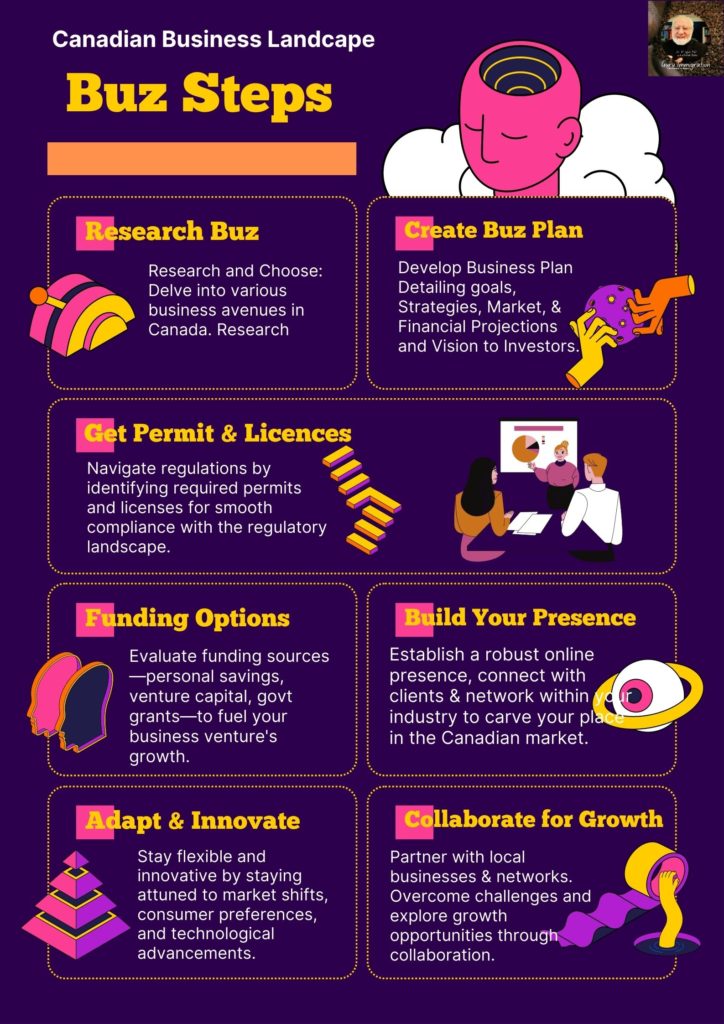
Exploring Business Opportunities in Canada: Your Path to Entrepreneurial Success.
Embark on Your Entrepreneurial Journey Towards Success in Canada
Are you intrigued by the idea of starting your own business in Canada? The land of opportunities beckons aspiring entrepreneurs with its diverse markets and welcoming environment. In this comprehensive guide, we’ll embark on a journey through the intricacies of exploring and seizing business opportunities in Canada. From understanding the steps involved to navigating regulations and fostering growth, you’ll discover the tools you need to embark on a successful entrepreneurial venture.
7 – Steps: Exploring Canada’s Business Landscape: Your Journey Begins Here
1. Research and Choose: Delve into various business avenues in Canada. Research industries, analyze market trends, and identify sectors aligned with your skills and interests.
2. Craft Your Business Plan: Develop a meticulous business plan detailing goals, strategies, target market, and financial projections to showcase commitment and vision to investors.
3. Secure Permits and Licenses: Navigate regulations by identifying required permits and licenses for smooth compliance with the regulatory landscape.
4. Seek Funding Options: Evaluate funding sources—personal savings, venture capital, government grants—to fuel your business venture’s growth.
5. Build Your Presence: Establish a robust online presence, connect with potential clients, and network within your industry to carve your place in the Canadian market.
6. Adapt and Innovate: Stay flexible and innovative by staying attuned to market shifts, consumer preferences, and technological advancements.
7. Collaborate for Growth: Partner with local businesses for shared expertise and networks. Overcome challenges and explore growth opportunities through collaboration.
This infographic provides a condensed overview. For details refer to official government sources.
Step 1: Unveil Entrepreneurial Avenues Discover the Path to Entrepreneurial Success in Canada, a journey tailored for those aiming to create and thrive in their own business ventures.
Step 2: Identify Opportunities Explore Opportunities: Delve into the diverse business opportunities and startup ecosystems present in Canada. Entrepreneurial Mindset: Cultivate an entrepreneurial mindset, embracing innovation, adaptability, and resilience.
Step 3: Business Idea Formation Brainstorm Ideas: Generate innovative business ideas that align with your skills, interests, and market demands. Market Research: Conduct thorough market research to validate your business idea’s viability and potential success.
Step 4: Business Planning Craft a Business Plan: Develop a comprehensive business plan outlining your objectives, strategies, and financial projections. Legal and Regulatory Compliance: Familiarize yourself with Canadian business regulations and ensure proper licensing.
Step 5: Funding and Resources Access Funding: Explore various funding options, including grants, loans, angel investors, and venture capital. Utilize Resources: Tap into Canada’s extensive network of entrepreneurship resources, incubators, and accelerators.
Step 6: Launch and Growth Execute Your Plan: Launch your business, implementing your strategies and offerings in the market. Adapt and Expand: Continuously adapt to market changes, seeking growth opportunities and expanding your reach.
Step 7: Navigating Challenges and Achieving Success Overcome Challenges: Anticipate and address challenges, using them as opportunities for learning and growth. Continuous Learning: Stay updated with industry trends, attend workshops, and engage in networking for ongoing success.
Step 8: Contribution and Impact Contribute to the Community: Contribute positively to the Canadian business landscape, creating jobs and fostering innovation. Entrepreneurial Impact: Embrace your role in driving economic growth and innovation, making a lasting impact.
Disclaimer and Contact Information – Seek Accurate and Updated Information: This post serves as a comprehensive informational guide to business opportunities in Canada. For the most up-to-date and accurate information, always refer to official government sources Canada Immigration website. If you have personalized inquiries or require guidance, feel free Contact Us.

